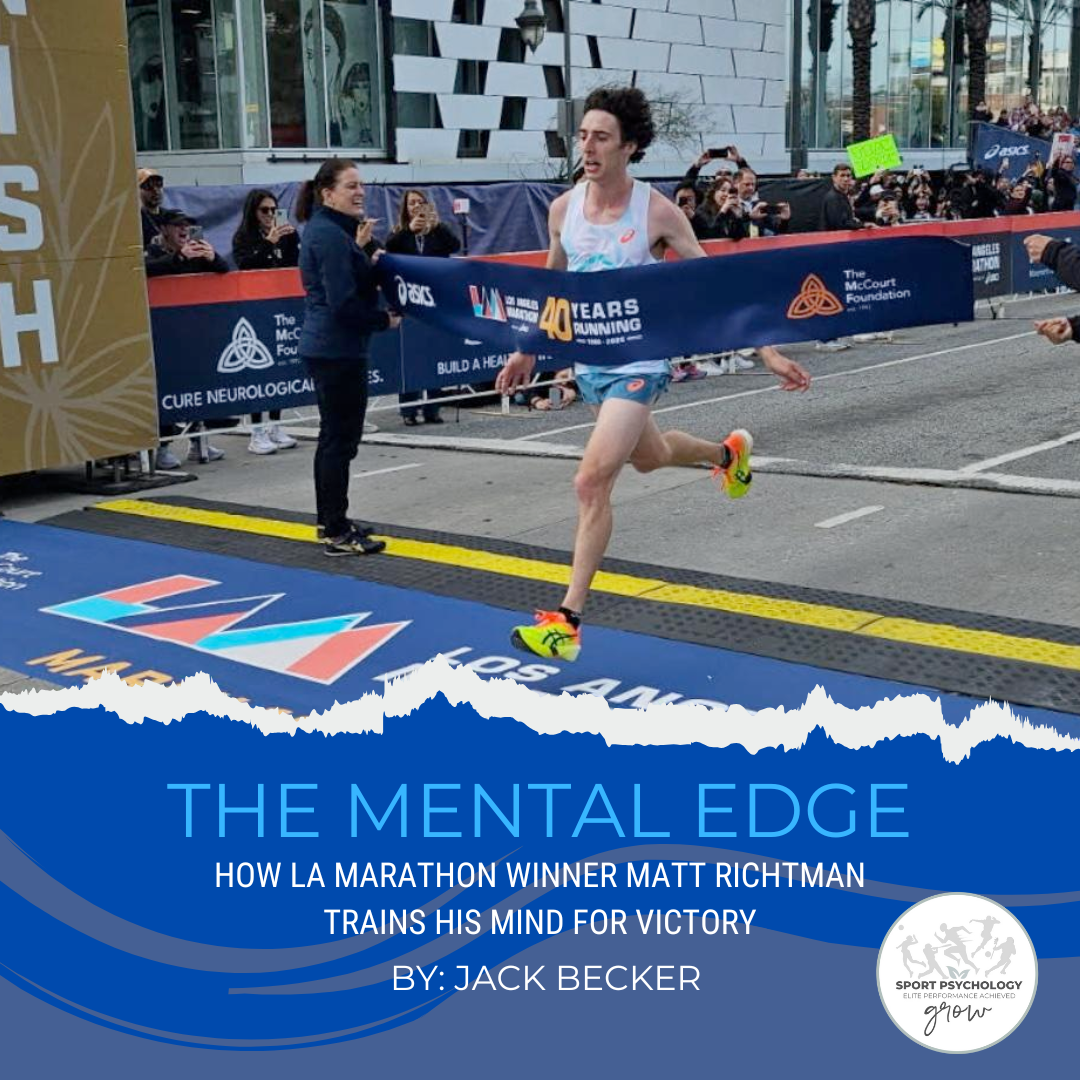


What separates a good athlete from a great one?
For Matt Richtman, champion of the 2024 Los Angeles Marathon, the answer goes far beyond training logs or split times. A former high school state champion, collegiate All-American, and now professional marathoner, Richtman’s success story is one of not only physical discipline but also deep psychological resilience.
In our exclusive interview, Matt shares how he mentally prepares for elite-level competition, stays focused through grueling races, and recovers from the emotional toll of training and performance. His experience offers invaluable insights for athletes and coaches at all levels—especially those looking to develop the mental side of sport.
Whether you're managing pre-race anxiety, rebounding from setbacks, or striving to perform under pressure, Matt’s approach shows how tools like visualization, cognitive reframing, and emotional regulation aren’t just helpful—they’re essential.
What kind of mental preparation did you do leading up to theLA Marathon?
“I did a lot of different preparations leading up to it. A lot had to do with researching the race and how I wanted to perform. I even re-watched old broadcasts to see how other athletes handled certain course sections—especially the ones that looked the most mentally draining.”
Matt’s strategy reveals a key truth: mental preparation is intentional. By studying emotional and tactical trends in past races, he created a mental roadmap—not just a pacing plan. This aligns with a core principle of sport psychology: success isn’t only about physical readiness, but about knowing how to think, adapt, and respond under pressure.
How do you stay mentally engaged during such a long and grueling race?
“That’s one of the most challenging aspects, especially early on. I try to stay mentally relaxed in the first half—not overthinking moves or competitors. In the second half, I focus on anything that keeps me engaged. Honestly, the spectator signs help a lot—they’re interesting and take my mind off the race!”
This technique—redirecting focus from internal discomfort to external stimuli—is a common tool in cognitive behavioral therapy (CBT). It helps athletes delay fatigue, manage negative thoughts, and stay emotionally balanced, especially in endurance events.
Do you use any visualization or mindfulness techniques before or during races?
“Absolutely. Visualization has been a part of my training since high school. It helps me see myself performing well, so when race day comes, I feel ready. I walk through every step—down to crossing the finish line.”
Visualization is one of the most widely used techniques in sport psychology. It primes the brain and body to perform by mentally rehearsing success. Athletes who use visualization consistently report higher confidence and greater focus, especially under pressure.
How did you adapt your mindset when transitioning from college to professional racing?
“It was tough at first. Suddenly, I was on the line with some of the best marathoners in the world. I had to move from a mindset of‘It’s okay if something goes wrong,’ to one where I had to be at my best just to stay afloat. I’m still learning, but I’m getting better at putting my mind in the right place.”
Transitions—whether from high school to college, or college to professional—can rattle even the most talented athletes. That’s where mental coaching comes in: building routines, confidence, and self-awareness to support performance at every level.
How do you deal with self-doubt or mental fatigue during a race?
“There’s always that voice saying you can give up or that it’s too hard. What helps me is knowing I’ve done everything I can to prepare.If my checklist is complete, I can trust I’m in good shape.”
Confidence isn’t random—it’s built on preparation and self-trust. Techniques like cognitive restructuring, which help athletes reframe negative self-talk, are invaluable for staying in the race mentally even when things get tough.
What role does mental recovery play in your overall training?
“It’s huge. If I’m not mentally at my best, everything else suffers. I’ve learned not to drain myself mentally. Taking things one step at a time and giving myself breaks helps me avoid burnout.”
Mental recovery is often overlooked in competitive environments, yet it's just as crucial as physical recovery. For sustained success, athletes need rest, reflection, and intentional decompression.
How has winning the LA Marathon changed your mental approach?
“It’s definitely relieved some pressure. I still have struggles, but now they’ve shifted. The big difference is I no longer just believe I can compete with professionals—I have results that prove it.”
This evolution highlights how external achievements can reinforce internal belief, helping athletes build sustainable confidence and a growth-oriented mindset.
What motivates you now compared to when you were in college?
“In college, the goal was nationals and All-American status. Now, it’s about fully committing to each race I enter and achieving the goal I’ve set for that specific event.”
Motivation is most sustainable when it’s process-driven, not outcome-obsessed. Setting intentional, individualized goals—as Matt does—keeps performance meaningful and mentally healthy.
If you could give one piece of advice to athletes aspiring to reach your level, what would it be?
“Figure out what works for your body and mind. If something isn’t working, find a different approach or take the pressure off. The more confident and happier you are, the better you’ll perform.”
Matt’s final message is clear: Mental self-awareness is a performance tool. When athletes are in tune with their needs—both physical and emotional—they’re more likely to thrive in training and on race day.
Matt Richtman’s journey to the top of the LA Marathon podium is a reminder that success isn’t just built on miles logged or workouts completed—it’s built in the mind.
Whether you're a youth athlete chasing your first big goal,a coach helping athletes push through plateaus, or a competitor eyeing the nextlevel, developing your mental skills can unlock performance you didn’t know was possible.
At Grow Sport Psychology, we help athletes build that edge—because true growth happens when the body and the mind train together.
By: Jack Becker, Grow Sport Psychology
To Learn More:
Call: 331-457-2020
Email: sports@growwellnessgroup.com
Website: growwellnessgroup.com